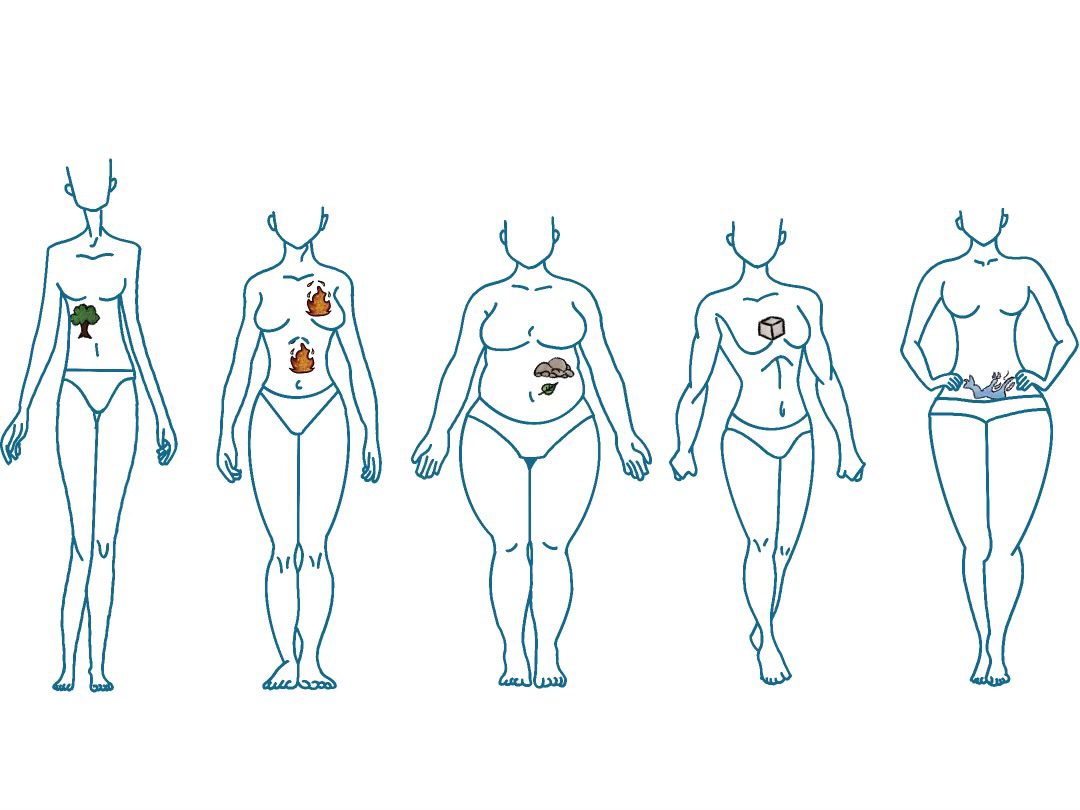So what is a person’s constitution when we talk in terms of natural health? And why is it so important?
When we speak of constitution, we’re talking about the make up of a body, its tendencies, its strengths and weaknesses, its imbalances… basically figuring out a “type” or pattern that will help us decide on how to achieve your goals in a way that will work best for you. You may have seen things on social media about knowing your “body type” or quizzes on “personalizing” a weight loss plan, trying to categorize which of the company’s set formulas you should purchase, or which of their workouts they will recommend to you. Determining your constitution is similar – what “type” or “category” you fall into will help us learn what lifestyle choices may be most suitable for you.
In Ayurveda, each individual’s constitution is a unique blend of three doshas: vatta, pitta, and kapha, with some being stronger than others. Each dosha has its own tendencies, strengths, and weaknesses. Knowing your constitution can help determine the best path to wellness for you. The California College of Ayurveda has a nice article HERE explaining the basics.
In Traditional Chinese Medicine (TCM), there are nine classifications of constitution, although, most people will be a blend of categories. Constitution is described in terms of physical attributes, illness tendencies, and types of imbalances. Eu Yan Sang has a simplified breakdown of each type of constitution HERE.
There are many other iterations of what constitutes a constitution, if you will, including the Three Somatotypes (endomorph, mesomorph, ectomorph), Five Elements (fire, water, earth, air, ether), the Four Humors (blood, phlegm, black bile, yellow bile), the Four Temperaments (sanguine, melancholic, phlegmatic, choleric)… for thousands of years people have been trying to classify and describe a person’s makeup and tendencies with respect to health.
When I begin working with a new client, I try to learn as much as I can about their past history, their tendencies, their current struggle and strengths, and their future health goals. I look for patterns that can help us understand what brings their body, mind, and spirit into balance, and what triggers imbalances. I don’t hold to any particular constitutional category, as I feel that each person is so unique that they can’t really be catalogued or classified, but looking at tendencies can offer us insight when formulating a plan.
Let’s look at an example:
I myself am always cold and dry. When I get stressed or nervous, I feel it in my belly and I can’t eat. I tend to be very emotional. I’m also very “in my own head”. When determining my lifestyle choices, then, I eat warming foods, stress hydration, dress in layers, use lots of relaxation and breathing techniques, and benefit from strategies that bring my energy downward, like grounding.
Another member of my family tends toward heat. He runs hot, loves air conditioning, feels sick if a heater blows warm air on him. He angers quickly and intensely, but it burns out just as fast. He feels stress in his chest, and illness typically presents itself as a general malaise with chest constriction. He benefits from cooling foods, nonrestrictive clothing made of breathable materials, the use of expansion techniques to dissipate his energetics, and use heart opening exercises. Herbal remedies with an affiliation for the liver have worked well, too.
Thinking about your constitution can help you discover what choices will most benefit your health journey. Do you tend to run hot or cold? Wet or dry? Are you logical and more controlled by your brain? Emotional and more controlled by your heart? Which body systems are your strongest? Your weakest? Where do you typically find your illnesses resting (are you a sinus person, a stomach person, a headache person, a lung person, etc)? Using this information, what changes can you make to your diet? How about the types of movement/ activity/ exercise that you do? What work on emotions and spirit will be helpful to create balance?
Need more direction with this? I can help! Reach out and let’s discover more about what makes you who you are, and how we can use that to plan healthy choices to get you to your goal!
Blessings,
Melanie


